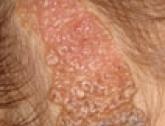Audio

Traction Alopecia Versus Alopecia Areata
Dr. Heath discusses the diagnosis of alopecia and how to distinguish traction alopecia from alopecia areata in black patients.
Adam K. Rosenstein, BA; Brian C. Machler, MD; Elliot D. Rosenstein, MD
Alopecia areata (AA) is a complication of biologic therapy with several anti–tumor necrosis factor (TNF) inhibitors and efalizumab for the treatment of various autoimmune diseases. We report the case of a 51-year-old woman who developed AA universalis while undergoing treatment with daclizumab, an immunosuppressive biologic therapy, administered for treatment of inflammatory ocular disease. Although immunomodulatory agents that function by interfering with T helper cell stimulation are expected to impede autoimmune-related processes, we believe that daclizumab may be causally related to the development of AA.

Dr. Heath discusses the diagnosis of alopecia and how to distinguish traction alopecia from alopecia areata in black patients.

Hair loss in children can have psychologic effects that interfere with a child’s growth and development.
Adolescent androgenic alopecia is pattern hair loss occurring in boys and girls younger than 18 years, whereas early-onset androgenic alopecia...
We report a case of a white woman with discrete, asymmetrical, noninflammatory areas of hair loss clinically suggestive of pseudopelade of Brocq (...
Alopecia universalis often responds poorly to standard therapies. We report how a novel treatment option, alefacept, was successfully used in the...

